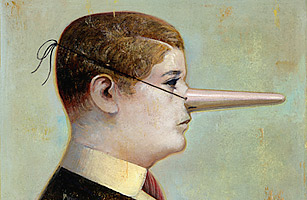
I’m not really a size 4. I know this because I was hardly a size 4 back when I was 15 and physically fit, and I’m neither of those now. But clothing stores know their customers, so they flatter us, supersizing their sizes until a 4 is as big as an 8 used to be, and we can all sleep better at night, confident that we’re slimmer than we were in high school. This is pretty much how our politics works now. We engage in magical thinking, imagining our problems are much smaller than they are, while our leaders hover nearby like helpful salespeople, telling us how good we look in our latest getup and that it’s really not that expensive. It is this pathetic pageant that inspires retired truth tellers like Alan Simpson, lately of the President’s deficit-reduction commission, to declare on Sunday-morning TV that “if you hear a politician get up and say, ‘I know we can get this done. We’re going to get rid of all earmarks; all waste, fraud and abuse; all foreign aid; Air Force One; all congressional pensions,’ that’s just sparrow belch in the midst of the typhoon.” Unless you start with the big four — Medicare, Medicaid, Social Security and defense — you will have no protection against the coming storm. So how loud the thunder, how strong the winds, before we reward leaders who tell the truth? Prime Minister Neville Chamberlain, who sang his nation a lullaby when he returned from Munich in 1938 and promised Britain “peace for our time,” has an enduring reputation as a comforting coward. Winston Churchill, who stood before the House of Commons less than two years later offering nothing but “blood, toil, tears and sweat,” claimed the mantle of greatness. Americans too honor leaders who speak hard truths, if sometimes only in retrospect. But just as often, we punish candor. Walter Mondale thought he was doing the right thing in 1984 by announcing that if elected, he would raise taxes; he lost 49 states, and Ronald Reagan raised taxes 11 times. George H.W. Bush agreed to a budget deal that laid the groundwork for a decade of prosperity — for which Bill Clinton got the credit, having bounced Bush from office. In an emergency, people don’t want to be soothed; they want to be saved. But bombs and fire concentrate the mind more than charts and graphs do. So what does that mean for American leaders facing epically dangerous deficits? It’s tempting to see in New Jersey Governor Chris Christie a Churchill for our times. He is Governor Wrecking Ball, cutting teacher pay, reducing state-worker pensions and killing infrastructure projects. And he’s treated like a rock star. But Christie is an anomaly. The odds of having an honest national conversation increase if the truth is actually what we want to hear, but every signal we send is “Keep selling us a size 4.” Our contradictions have consequences. Believe that low taxes promote strong growth? Fine, but be prepared to devote some of the money you save to funding cancer research, paying for the music classes your school just canceled and taking care of the men and women who come home from the wars they fight to protect us. If we punish politicians for honesty, we should not expect it. If we don’t practice it ourselves, we won’t recognize it. See TIME’s Top 10 Everything of 2010.
See TIME’s best pictures of 2010.